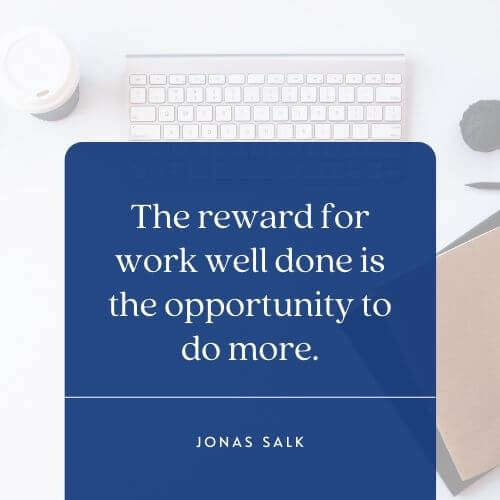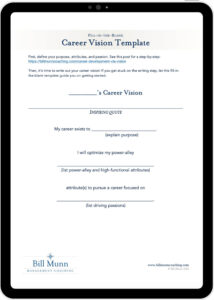Applying the law of compensation is not just the secret to earning more money. It’s a mindset that helps you continuously grow, increase your value, and contribute to your team and community.
The approach is a timeless one, but it’s worth considering anew: your effort and contributions determine the return you receive.
In other words, what you give is what you get.
In this post, we’ll look at:
- What the law of compensation is
- 2 mindset shifts that will help you increase your value
- 3 practical ideas for making the law of compensation work for you right away
What Is the Law of Compensation?
In Ralph Waldo Emerson’s 1841 essay “The Law of Compensation,” he wrote
The world looks like a multiplication-table, or a mathematical equation, which, turn it how you will, balances itself. Take what figure you will, its exact value, nor more nor less, still returns to you.
Ralph Waldo Emerson
The law of compensation may sound a bit callous and less than romantic, but in the grand scheme of things, it’s actually a force for good. It’s also pretty darn true: generally speaking, the work we put in determines what we get out. Input and output are correlated.
Are you interested in a promotion?
Seeking to build deeper relationships?
Want to make more money?
Desire more meaningful, intimate engagement with your spouse?
Hoping to end up on the board?
The secret to achieving your goals may very well lie in making the law of compensation work for you. Here’s how it plays out:
- Your compensation reflects your value
- Your value is determined by your work
- Better work = greater value = greater compensation
Whether that compensation comes in the form of more meaningful relationships or a more rewarding job, the equation works in the same way.
Better than Better
It takes a substantial amount of persistence and action to make the law of compensation begin working in your favor. But the real secret is a change in attitude.
1. Make the Work the Reward
If the goal of your effort is reward, your effort will never be first rate.
Instead, adopt an attitude that celebrates and embraces the work itself as a rewarding, fulfilling opportunity to contribute and improve.

When you learn to appreciate the work you’re doing rather than what it might accomplish, you invest in the work in a more meaningful, productive way.
So your work improves.
2. The Magic of Above-and-Beyond
To see this in action, let’s take financial compensation as our example:
If you continually enhance the value you’re delivering, keeping it higher than your compensation, then you put constant upward pressure on your pay.
If, on the other hand, you rest on past successes, letting your value stagnate or decline, that upward pressure will deteriorate.
To keep the upward pressure, don’t aim for acceptable. Aim to provide value above-and-beyond what’s expected and needed.
You’ve likely heard someone complain that they’re worth more than what they’re being paid. The next time you encounter this situation, surprise them with this response:
“Great! If your compensation is lower than your value, there’s long-term upward pressure on your pay! You’re in an excellent position!”
You’ll probably be met with an incredulous stare, but rephrase their statement:
“If you were paid more than your actual worth, would you be confident when it comes to future compensation?”
How to Increase Your Value with 3 Tools
It’s certainly possible to make the law of compensation work for you, but it can be overwhelming too. How do we constantly make ourselves more valuable? Is it realistic to think we’ll keep up with this effort long-term? And where to begin?
I believe there’s great power in brevity, so I’ve selected 3 brief suggestions that can help you apply the law of compensation on an ongoing basis:
1. Educate Yourself Continuously
Yes, continue learning about your field. But while you’re at it, take time to learn about other things as well—related fields, subjects that interest you, influential people of the present or the past, etc.
Keep a running list of subjects that both intrigue you and can boost your skill sets. Take online classes, browse your local bookstore, ask questions, and support others in related fields.
2. Encourage Others
If we adhere to the law of compensation, we should receive a level of reward in keeping with what we’ve put into the world.
So rather than focusing on catching others’ mistakes (which is not only unappealing, but also less effective for lasting change), catch others doing things well, focusing on the accomplishments of those around you. This includes your peers, superiors, subordinates, friends, and family members.
In the workplace, this approach creates a positive ripple effect: when you encourage your teammates and give credit when it’s due, you create a pro-teamwork environment of validation and motivation.
3. Create a Job Vision
Don’t make the mistake of viewing your work in terms of job descriptions. Instead, look at the large vision for your role. (Bonus points if you do this in the context of your life vision.)
A clear job vision helps you think more broadly about your role, viewing your behaviors and the improvements you could make at a more sophisticated level. Often, it will help you review the way that your boss (or your boss’ boss) might look at your position.
A less myopic vision can also help you brainstorm new ways in which you can contribute, thereby increasing your value to the company.
If you’re not ready to get started on your full personal vision or the Vision Academy today, I get it, and I’ve got you covered. This quick and free fill-in-the-blank career vision template is a great starting point:
Job Description vs. Job Role
A job description describes what you do, i.e., your specific activities and tasks. A vision, on the other hand, asks you to think bigger. It describes why your role exists, what it feels like, and how it affects the total effort of your team or company.
For example:
- Where your job description might include “creating advertisements,” the vision would say, “enhance customer demand.”
- Where your job description might specify that you are to “handle customer complaints,” your job vision would explain that your goal is to “improve customer experience.”
Make the Law of Compensation Work for You
The law of compensation isn’t just about earning more money or climbing the ladder. It’s about increasing your value by adopting an attitude that focuses on your contribution rather than your reward (and in so doing, happens to improve your rewards in more ways than one).
Have you tried this mindset shift and seen results? Please share your experiences in the comments.
And if you’d like to shift from learning to doing and create a plan for making the law of compensation work in your life and career development in the long term, let’s talk.






This article is an eye opener, I’ve just got a transformed mindset within minutes.
Pls I’ll like to know more 🙏
Excellent interpretations. You have a structured training module ?
Thanks! I do have 2 courses. If you’d like to discuss, please reach out via the Contact page.
I’m encouraged! Please continue helping us with such information.